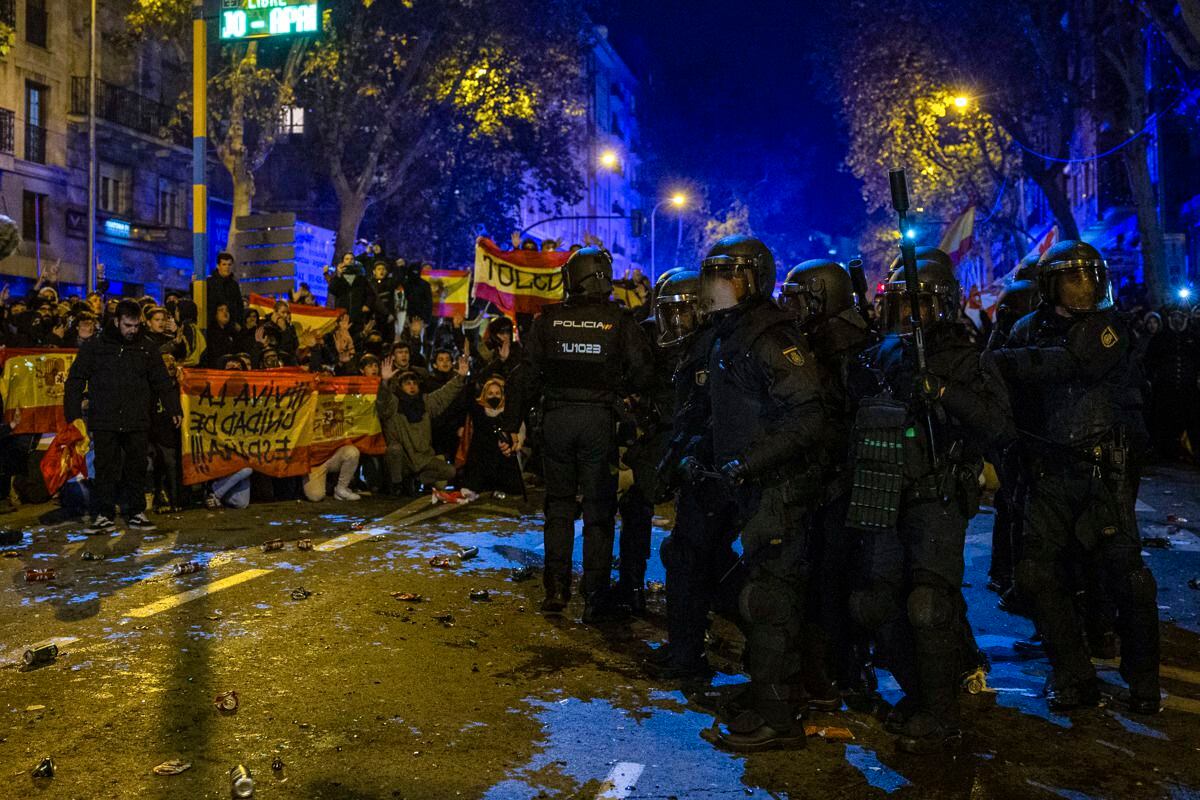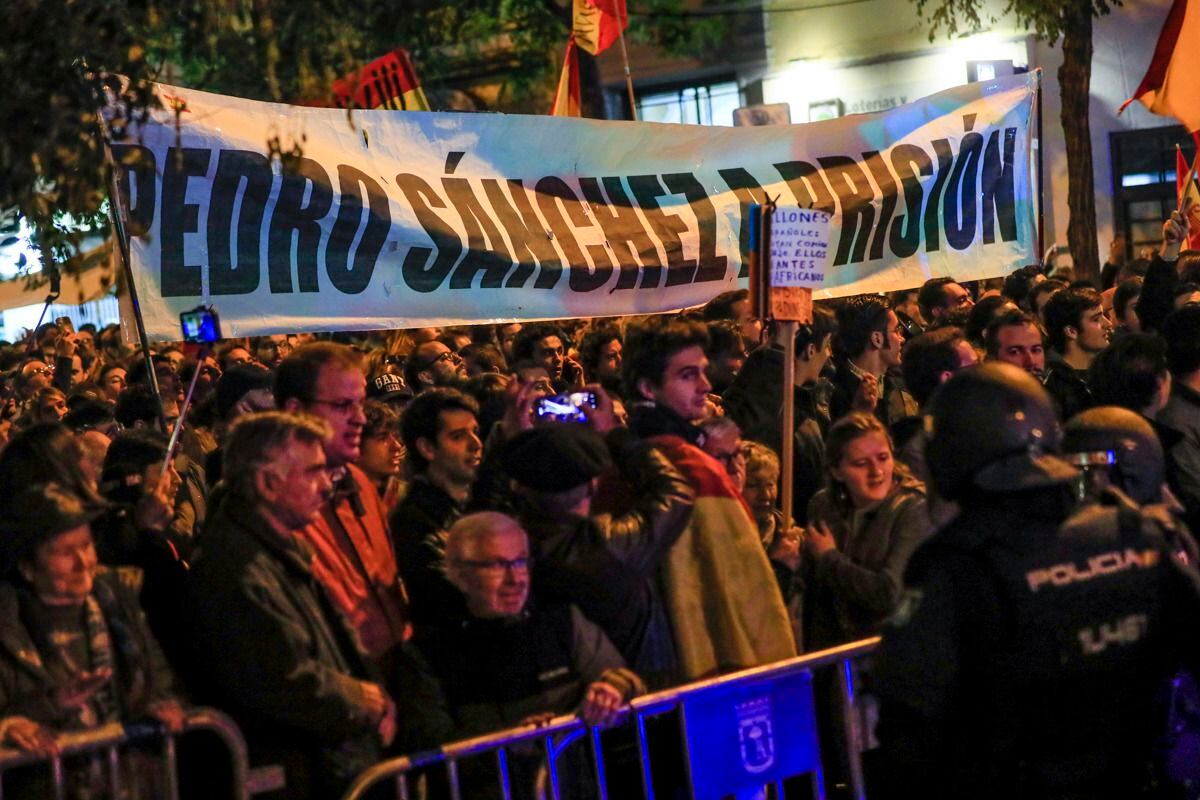Between Spanish flags and shouts of “let’s stop the betrayal” and “Spain It is not for sale”, thousands of people have joined protests in recent weeks in front of the headquarters of the PSOE (Spanish Socialist Workers’ Party) in several cities across the Iberian country. The reason for the discontent is the amnesty project for Catalan independence activists promoted by the acting head of government, Pedro Sanchesin exchange for the votes needed to maintain his position.
TO LOOK: Protests in Spain before the socialist party against an amnesty for Catalan independence activists
The PSOE, led by Sánchez, finished second in the July 23 legislative elections, behind the conservative Popular Party, which failed to gain the parliamentary support needed to come to power. Now the Socialists are negotiating with Catalan separatist parties to support their efforts to form a new government and keep their center-left coalition in power. Your support is essential to achieve this.
By him, Sanchez accepted the independentists’ demand to prepare an amnesty law for separatists prosecuted by the Spanish justice system, among them the leaders who fled Spain after its failed secession attempt in 2017. The agreement provoked outrage in several sectors, including the main opposition parties and right-wing groups.
The protests led to incidents on Monday night in front of the PSOE headquarters in Madrid, with three arrests and the use of tear gas by riot police. Santiago Abascal, leader of the radical right-wing group Vox, the third largest group in the Congress of Deputies, participated in the march and called for a “permanent, constant and growing mobilization”.
The conservative Popular Party (PP) called for demonstrations across Spain. “I will not allow, in the name of my country (…) to ask for forgiveness from those who attacked and those who attacked the institutions”, said the leader of the PP, Alberto Núñez Feijóo.
Although political tension increases, negotiations between socialists and independentists continue. Sanchez obtained the support of the seven deputies of the Republican Left of Catalonia (Esquerra Republicana de Catalunya, ERC), but must also guarantee the support of the seven of Together for Catalonia (Junts per Catalunya, JxCat), the party of Carles Puigdemont, leader of the attempt to 2017 and directs negotiations on the agreements from Brussels.
Sánchez has until November 27 to form a government or parliament will be automatically dissolved and new elections will be called for January.

Enrique Banús, director of the Institute of European Studies at the University of Piura, highlights that Sánchez needs the Catalans to be a government and, therefore, is negotiating and giving in on several points.
In addition to the amnesty bill, which would have to be voted on in Parliament, “another point of the agreement is the transfer of powers to the Catalan government, to which they have just handed over responsibility for the suburban railways. The other thing that is up in the air is the issue of recognition of the Catalan nation and the referendum, because Catalonia is recognized as a nationality, not as a nation”, he explains to El Comercio.
The expert believes that Sánchez’s strategy with the Catalans has been to let time pass, believing that the closer the deadline approaches, the easier it will be not to have to give up everything. The problem is that the Catalans have the same strategy. The Catalans are two different groups. Puigdemont is developing an interesting strategy, which is to reach an agreement and then seek to add more orders to negotiate again and so on.
“As for amnesties, Pedro Sánchez will end up giving in on everything. He has already given up on a lot and will continue to give up because he has no choice. Sánchez is negotiating an agreement from below that allows him to govern and for many people the problem is not governability, but rather the fact that he governs above a series of fundamental principles. This is being used very well, especially by Puigdemont, who is a very skilled character”, says Banús.
Not only do the protests taking place in different parts of Spain increase the pressure on Sánchez, but, at the same time, the justice offensive against independence leaders like Puigdemont continues.

Spanish justice, which is already demanding Puigdemont for his role in the events of 2017, announced this Monday, the 6th, that it is also investigating him for the riots that took place in Catalonia in 2019 in protest against the prison sentences of other independence leaders.
Furthermore, the General Council of the Judiciary (CGPJ), a collegial body that appoints judges, approved a declaration with the vote in favor of conservative members in which they denounced that the amnesty project could “degrade” and “convert the rule of law as an object Of marketing”.
For Banús, it is clear that with the agreement Puigdemont will be able to return to Spain and all disqualified figures will be able to run again and participate in political life “as if nothing had happened”.
“As long as this happens, the anger will continue. PP and Vox voters do not agree at all with this measure and a part of socialists do not agree either because it shows that many things are negotiable that for many do not seem so negotiable. Legal experts are also divided. What all this is doing is deepening the division that has been worsening for some time and is a legacy of Pedro Sánchez. Today there is a lot of tension, the tones are very sour and virulent and this does no one any favors”, says the analyst.
For now, demonstrations have been called for Sunday in the country’s provincial capitals, and for Saturday, November 18, a large protest in Madrid.
Source: Elcomercio
I am Jack Morton and I work in 24 News Recorder. I mostly cover world news and I have also authored 24 news recorder. I find this work highly interesting and it allows me to keep up with current events happening around the world.

:quality(75)/cloudfront-us-east-1.images.arcpublishing.com/elcomercio/BXLUZ5PEQFGHPMNR54DWRM3BXQ.jpg)

:quality(75)/cloudfront-us-east-1.images.arcpublishing.com/elcomercio/DKBLNJHMAVBEVNSHTNMVHPAK4A.jpg)
:quality(75)/cloudfront-us-east-1.images.arcpublishing.com/elcomercio/HTNQRPYKCRC3NEOOMT4BGWERMU.jpg)
:quality(75)/cloudfront-us-east-1.images.arcpublishing.com/elcomercio/XORHL2HYGZHTBCZIW3D7W3UMSM.jpg)

